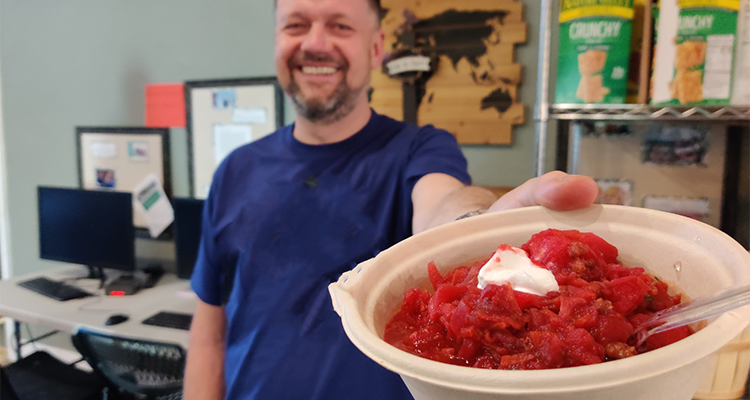
A man holding a bowl of borscht served to Ukrainian refugees at Spring Valley Community Church of the Nazarene.

A man holding a bowl of borscht served to Ukrainian refugees at Spring Valley Community Church of the Nazarene.
After weeks of travel, a young family who fled the war in Ukraine smelled something familiar as they walked into Spring Valley Community Church of the Nazarene in Spring Valley, California.
Borscht.
Borscht is the national dish of Ukraine. As the mother poured a bowl for herself, her husband, and their young daughter, the tension in the family’s shoulders began to unwind. Laughter began to flow as they found themselves in a place that felt more like home than anything else they had experienced in weeks.
This young family includes just three of the nearly 100,000 Ukrainian refugees who will legally enter the United States through the Southern California/Mexico border over the next several weeks.
Spring Valley Community Church has set up a Ukrainian refugee hub that provides a place to stay for a few hours or even a few nights before the refugees move on to their final resettlement location in the United States.
When a group of refugees is picked up from the American side of the border after customs processing, the church sends a team to help them load up and head to the church, where they are checked in.
At the hub, the refugees can eat and shower, do laundry, and rest. Many of them have crossed multiple borders. Each crossing can take days, and stories of their passage are filled with harrowing details.
Since they began hosting the refugee groups last week, Spring Valley Church has sheltered and fed over 375 refugees. In addition, the church has received assistance from more than 150 volunteers who have provided aid at the hub, donated items, or even found borscht recipes to help the refugees feel at home.
Steve Babbitt, senior pastor at Spring Valley Church, recalled Matthew 25 where Jesus is questioned by the people asking, “Lord, when did we see you hungry?” Jesus replies in verse 40, “Truly I tell you, whatever you did for one of the least of these brothers and sisters of mine, you did for me.”
“We have just been trying to recognize that Jesus is in the midst of those that are suffering,” Babbitt said. “Our God is a God who is well acquainted with grief and understands the heart of these people.”
Many of the refugees are guarded and protective upon first arriving to the church. Babbitt and the volunteers had thought that beds and showers along with a place to rest their feet would help bring comfort to the refugees. In reality, it has been the borscht.
The soup, made with beetroot, is bright red and can also contain a variety of meat and vegetables depending on the region of the country where the dish is made. With so many different variations, Babbitt likened it to American chili.
Volunteers have specifically signed up to make borscht so the hub has an around-the-clock supply to help them feel at home.
“I can’t even think of something more biblical than sharing a meal,” Babbitt said. “From Passover to the Last Supper, meals are woven throughout scripture, so that home food has been a blessing.”
Babbitt hopes that the hub has helped restore some dignity to the refugees, who have been through so much in just a few weeks.
“They have one more leg of their trip to go, and when they’re leaving here, they’re fed, they’re showered, they’re feeling human again,” Babbitt said.
As the refugees thank the hub staff, Babbitt and the volunteers thank the refugees in return.
“We always say back to them, ‘No, thank you. Because you have shown us Jesus,’” Babbitt said.